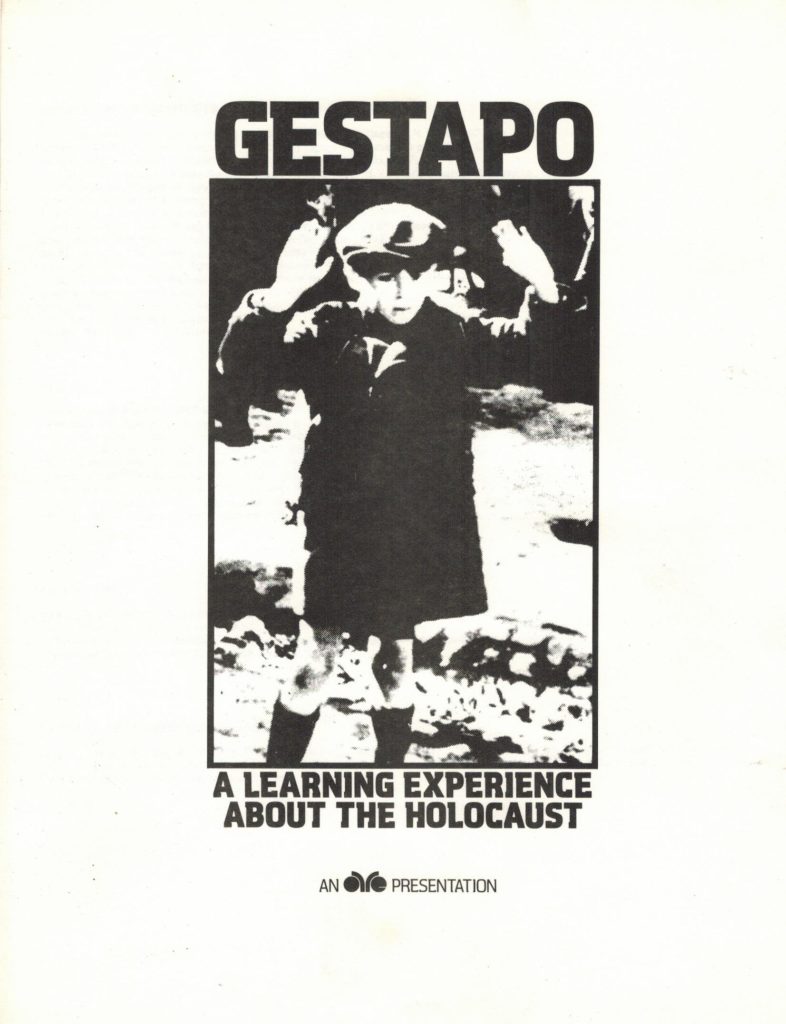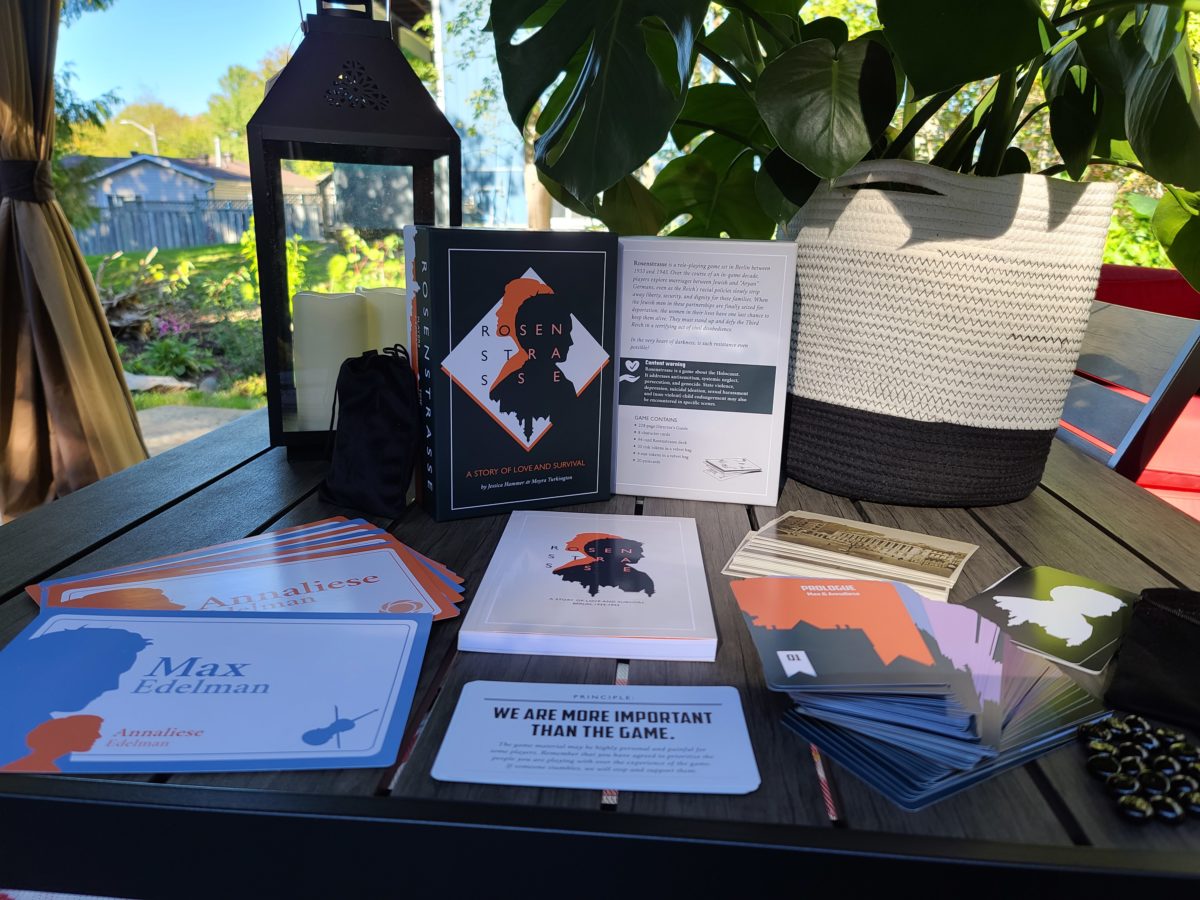The discourse surrounding Holocaust-based simulation exercises and games underscores pedagogical and moral possibilities and limitations for educators or designers. Holocaust simulations are viewed as an outlet for participants to emotionally and psychologically engage with the past. Holocaust-themed exercises invite participants to experience victimhood, complicity, lack of agency, and loss. From Ron Jones’ Third Wave experiment (1967) to Rabbi Raymond Zwerin’s Gestapo board game (1976), educators have used simulation exercises to teach students about the historical milieu that allowed the Holocaust to happen. Although Jones’ experiment attracted little attention at the time, Zwerin’s board game quickly became a “catchphrase for any kind of concentration camp simulation” (Fallace, 2007, p. 2659).
For many, Holocaust simulation is ill-equipped to approach Holocaust education. Critics argue that these simulations dumb down historical reality and generalise complex events to the point of distortion (Parsons & Totten, 1994, p. 8; Totten, 2000). Yet research into Holocaust simulation in practice is still relatively speculative. Simone Schweber’s study of a California teacher’s classroom exercise, the most comprehensive study of Holocaust simulation in practice, was not published until 2003 and attracted a range of criticism (Schweber, 2003a). Schweber’s extensive research found a consistently high student engagement, both academically and emotionally. As Fallace documents, an exchange between Schweber and Miriam Ben-Peretz ensured, with the latter criticising the simulations shortfall in teaching the students the historical context behind the Holocaust (2007: pp. 2643; Ben-Petetz, 2003; Schweber, 2003b).
Despite persistent criticism, participation-based exercises and media have continued to develop online and offline. As the Holocaust TikTok trends emphasise, younger generations frequently look beyond the classroom to engage with the past, using everyday lives to reflect and comment (Anon., 2020). Although Holocaust engagement on social media is a contentious issue (Sanderson, 2022, p. 9), it indicates how younger generations seek unconventional, even taboo, approaches to respond to atrocities.
This year, Unruly Designs will release a new Holocaust-themed board game. While Rosenstrasse is not the first Holocaust-themed TRPG (Tabletop Role-Playing Game), it represents this new era in Holocaust consciousness. Jessica Hammer and Moyra Turkington have discussed the challenges and lessons addressed when developing the game (Hammer & Turkington, 2021). This post does not aim to repeat their findings, but rather briefly evaluate Gestapo and future Holocaust games in response to some of Rosenstrasse’s game design choices.
Holocaust TRPGs
Despite being developed more than thirty years apart, both Rosenstrasse and Gestapo attempted to represent the persecution of the Jews from 1933 onwards. Whereas Rosenstrasse focused on a specific group of victims, namely mixed couples (husband Jewish, wife “Aryan”) from Germany, Gestapo reflects the broader history of the Holocaust. Furthermore, although Gestapo covers the death camps and deportations, Rosenstrasse gameplay climaxes with the Rosenstrasse protest: “During this phase of the game, the players alternate between playing imprisoned male characters, and the female characters at the protest” (Hammer & Turkington, 2021, p. 47). Rosenstrasse was designed to represent the victims of the Holocaust through a moment of resistance instead of passivity. Therefore, although both TRPGs cover similar periods of history, their historical narrative is vastly different due to the Rosenstrasse focus on a select group of historical figures.

Historical accuracy
Although Rosenstrasse is specifically designed for adults (Hammer & Turkington, 2021, p. 49), it shares several overall goals with Gestapo. Namely, they both aim to encourage participants to use their experience in the game to reflect on contemporary society and “consider what they might be able to do to resist injustice today” (Hammer & Turkington, 2021, p. 47).
How these games achieve historical accuracy highlights Holocaust education’s emergence out of the classroom and into the public sphere. Whereas Gestapo relies on the educational milieu and individual teachers’ knowledge and skill to avoid historical misconceptions, Rosenstrasse embeds the function of the teacher in the game. The game’s facilitator (or moderator) does not require prior historical knowledge or background but instead follows the facilitator guide, pre-game workshops, scene notes, and post-game debrief to direct the gameplay (Hammer & Turkington, 2021, pp. 51-52). By explaining “why the scene is happening, [the facilitator] can help [the participants] decide what to do.”
Like Gestapo, the success of Rosenstrasse is still dependent on the facilitator’s expertise in handling the supplementary material, the environment of the gameplay, and the participants’ willingness to engage with the narrative. Participants can “modify or ‘drift’ the published rules by creating house rules applicable to a specific campaign” (White et al., 2018, p. 67). In the case of Holocaust TRPGs, they can bend the historical limitations embedded into the game to the point of distortion. Whereas a teacher may be influenced by the desire to “keep to the curriculum”, a facilitator has a professional obligation to “stick to the rules.” Nevertheless, as Fallace and Schweber’s work highlights, even within an educational environment, Holocaust games can be adapted beyond the developers’ original intentions (2007; 2003a).
Over-identification
Although a competent teacher or facilitator can determine whether a Holocaust TRPG remains historically accurate, ensuring that participants maintain a healthy relationship between their characters is a much more arduous task. Because one of the primary reasons for educational simulations is for the participant to learn through doing and feeling, the risk of over-identification is elevated.
While identification is not automatically a limitation within Holocaust studies, a participant with little prior knowledge who over-identifies with a fictional victim may develop flawed or generalised assumptions about all victims. Furthermore, the participant may confuse their own agency with their character’s and consequently have unrealistic expectations about what they can and cannot do within a historically accurate milieu. As Hammer et al. note, participants may blur the line between character and player when the participants’ “thought and feeling influence the character or vice versa” (Hammer et al., 2018, p. 292).
Although Zwerin’s development of Gestapo does not appear to incorporate any safeguards to prevent over-identification, he did attempt to recreate the randomness of survival and the lack of agency experienced by victims. The game’s odds of survival were designed to reflect the percentage odds of victims actually surviving the Holocaust (Fallace, 2007, p. 2657) and not the individual player’s skill. Zwerin notes that because of this, some of the worst players of Gestapo were actual Holocaust survivors because “it was sheer dumb luck in most cases that people survived” (Fallace, 2007, p. 2658).
With Rosentrasse, the developers moved beyond the randomness of “die roll-playing” or “card shuffling” to create a lack of agency and instead developed a game narrative that would purposely avoid “action” moments. For example, participants are not allowed to make choices during Kristallnacht, but instead, they are required to make character decisions “in the aftermath”:
Another example is our Kristallnacht scene, directed to intellectuals Klara and Josef. The scene does not occur during Kristallnacht, which might invite players to think they can intervene. Instead, it takes place in the aftermath. Klara and Josef must decide whether to invite social censure by helping a Jewish business owner recover from the destruction of her shop. No matter what they choose, they cannot stop the violence, only respond to it.
(Hammer & Turkington, 2021, p. 50)
Like the game’s focus on specific Holocaust victims, the decision not to allow participants to interact with historical events like Kristallnacht highlights how developers of Holocaust-themed games can carefully control participants’ experiences and ensure historical accuracy. Although no design choice is foolproof, the decisions highlighted in their 2021 article emphasise how taking a micro-perspective approach to developing a historical game can help developers avoid many of the challenges highlighted in the extensive discourse on Holocaust simulation, media, and fiction.
Conclusions
The game design behind Rosenstrasse highlights how designers can look beyond narratives of survival to develop Holocaust-themed games. Focusing on a particular group of people avoids generalisations about the Holocaust and places participants into a particular historical milieu. Although the game design highlights a carefully constructed narrative, it is difficult to determine how audiences will respond to, identify with, and reflect on Rosenstrasse.
Despite differentiating itself from Gestapo, Rosenstrasse still struggles with similar issues that face all Holocaust simulations. As the gameplay is dependent on the facilitator’s success, experiences of the game may be inconsistent from group to group. Despite this, Rosenstrasse highlights the possibilities for game designers hoping to develop Holocaust-themed TRPGs without running the risk of distorting history. The “micro” approach, when done well, could be an effective method for tackling historical atrocities. However, without extensive primary research on the game in practice, it is still too early to determine the overall educational value of Rosenstrasse and future Holocaust TRPGs.
Rosalind Hulse is a doctoral researcher at Royal Holloway, University of London. Her project explores American Holocaust education and memory, with a focus on public Holocaust controversies in American high schools between 1967 to 2019.
Works Cited
Anon., 2020. “TikTok Holocaust trend ‘hurtful and offensive’.” [Online] Available at https://www.bbc.co.uk/news/newsbeat-53934500 [Accessed 20 January 2022].
Ben-Peretz, M. 2003. “Identifying with Horror: Teaching about the Holocaust: A Response to Simone Schweber’s “Simulating Survival”, 33(2), pp.189-198.
Fallace, T. D., 2007. “Playing Holocaust: The origins of the Gestapo simulation game.” Teachers College Record, 109(12), pp. 2642-2665.
Hammer, J. et al., 2018. “Learning and Role-Playing Games.” In: J. P. Zagal & S. Deterding, eds. Role-Playing Game: Transmedia Foundations. New York: Routledge, pp. 283-299.
Hammer, J. & Turkington, M., 2021. “Designing role-playing games that address the Holocaust.” International Journal of Designs for Learning, 12(1), pp. 42-53.
Parsons, W. & Totten, S., 1994. Guidelines for teaching about the Holocaust. USA: United States Holocaust Memorial Museum.
Sanderson, D., 2022. “Auschwitz survivor: TikTok can’t teach children about Holocaust.” The Times, 18 January, p. 9.
Schweber, S., 2003a. “Simulating Survival.” Curriculum Inquiry, 33(2), pp. 139-188.
Schweber, S., 2003b. “Rejoinder to Miriam Ben-Peretz” Curriculum Inquiry, 33(2), pp. 199-206.
Totten, S. 2000. “Diminishing the Complexity and Horror of the Holocaust: Using Simulations in an Attempt To Convey Historical Experiences.” Social Education, 64:3, pp.165-71.
White, W. J. et al., 2018. “Tabletop role-playing games.” In: J. P. Zagal & S. Deterding, eds. Role-Playing games studies: Transmedia Foundations. New York: Routledge, pp. 63-86.

0 replies on “Gestapo (1976) and Rosenstrasse (2022): Challenges and lessons for Holocaust-themed TRPGs”
[…] making games about the past. The theme kicked off with the fantastic Rosalind Hulse, discussing Gestapo (1976) and Rosenstrasse (2022): Challenges and lessons for Holocaust-themed TRPGs. We’ve also included posts on Education resources and Adam Chapman has a two-part post on the […]
[…] had fascinating insights from Rosalind Hulse (RHUL) exploring some key challenges and lessons for Holocaust-themed TRPGs, paying particular […]
[…] Rosenstrasse was featured in the Historical Games Network article Gestapo (1976) and Rosenstrasse (2022): Challenges and lessons for Holocaust-themed TRPGs. […]
[…] activity in a catalog for teachers in the late 1970s — making him one of thousands to purchase Rabbi Raymond Zwerin’s Gestapo game since its release in […]